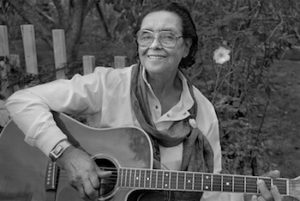
Etta Baker
*Etta Baker was born on this date in 1913. She was a Black singer, composer, and musician, one of the last surviving original American folk-blues performers.
Born Etta Lucille Reid, she came from the rural foothills of Caldwell County, North Carolina. Her parents played several instruments, and she picked up a guitar at age 3. Later in her life, she recalled, “I was so small, I had to lay the guitar on the bed, stand on the floor, and play on the neck.” She had seven brothers and sisters who also played, and at an early age, she performed old-time breakdowns, waltzes, and two-steps with them on family and local community occasions.
By the late 1920s, she was highly skilled on the six—and twelve-string guitars and had mastered the Piedmont blues style. Admired across the southeastern states of America, this style was softer and more melodic than the more guttural Mississippi blues and grew out of the harsher landscape of the Delta. Yet, like many traditional musicians of her era, playing was not a career but something she did for personal fulfillment and the pleasure of her immediate community circle.
With music taking a back seat to being a wife and mother (her nine children included two sets of twins), it was not until 1956 that she was first recorded when the New York-based folk singer Paul Clayton was visiting North Carolina and heard her playing a song called One-Dime Blues. He returned the following day with a tape recorder and made several field recordings of her playing, which he anthologized on the Instrumental Music of the Southern Appalachians album. The collection became one of the most influential recordings of the acoustic folk and blues revival of the late 1950s and early 1960s, and at least two of Baker’s songs, One-Dime Blues and Railroad Bill, became American standards.
The record also led to requests to perform at folk festivals across America, all of which were declined. She revealed many years later, “My husband could play piano well, and we could have made it, but he did not want to leave home.” With Baker not touring, other musicians traveled to the South to see and hear her. Clayton had a cabin near Charlottesville, Virginia, where he would bring friends from the Greenwich Village folk scene for weekends and invite Baker over to play for them.
One weekend in 1962, he arrived with Bob Dylan and Dylan’s girlfriend Suze Rotolo to celebrate Dylan’s 21st birthday. Soon afterward, Dylan adapted Clayton’s song Who’s Going to Buy You Ribbons (When I’m Gone) into Don’t Think Twice, It’s Alright, in which the influence of Baker’s finger-picking guitar style can be recognized. During and after the 60s and 70s folk revival, Baker worked for the next two decades at the Skyland Textile Company factory in Morganton, North Carolina, until she reached retirement age.
In the 1980s, after the death of her husband, Lee, she began accepting invitations to perform beyond Caldwell County. Although in her seventies, she became a much-loved attraction on the folk and blues festival circuit, appearing all over America and Europe. For the first time, she secured copyright control of her early field recordings and, in 1991, recorded her first studio album, One-Dime Blues. It was followed in 1999 by Railroad Bill, and in 2004, she recorded an album with Taj Mahal, who had been performing her material for decades.
Her final recordings appeared on the album Carolina Breakdown in 2005. A famous southern matriarch, her immediate family had expanded to 108 members and five generations. Etta Baker died on September 23, 2006, at the age of 93.